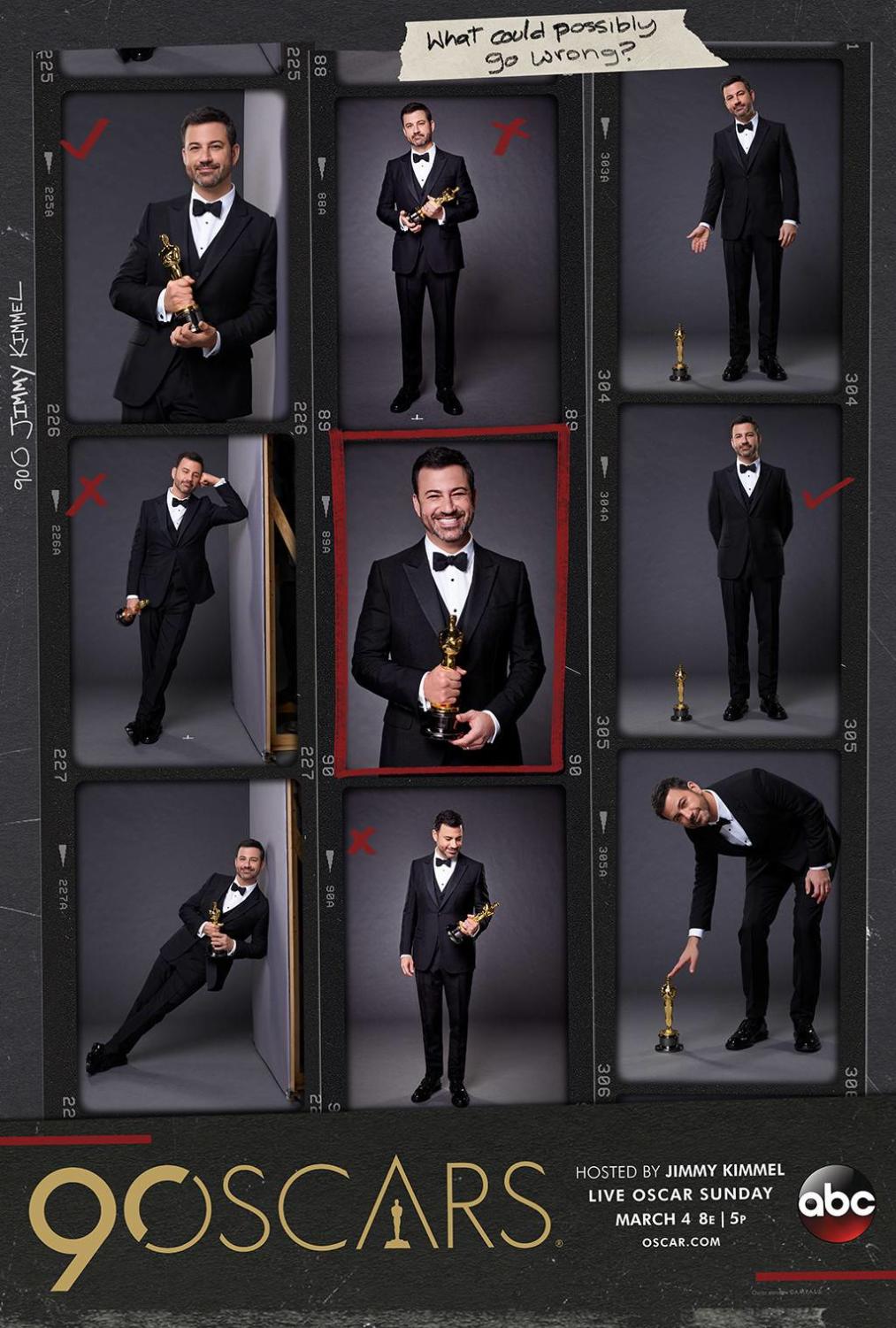Created by Danny Nguyen using Canva
Hollywood, the town filmmaking, movie-going, and Oscar-receiving. The three depend on each other to survive and define a film’s impact on the world. It is a complicated town, which is why it needs to listen up if it wants to continue to function.
It’s complicated: the Oscars and how people see them
March 9, 2018

The many frames of Jimmy Kimmel serves as the centerpiece of this promotional poster for the 90th Annual Academy Awards that aired on ABC on Sunday Mar. 4. The awards show drew controversy on various topics.
On Sunday, March 4th, the 90th Annual Academy Awards telecast, hosted once again by the ABC network’s very own late night talk show host Jimmy Kimmel, aired on the channel to celebrate the achievements made in film for the year 2017.
And the ceremony certainly had its moments, whether it be referencing what happened last year with that whole Best Picture fiasco, slightly poking fun at the Trump administration, shining a light on the #MeToo movement amidst the recent sexual assault accusations floating around, emphasizing the importance of diversity across the board and even paying tribute to cinema’s long history of portraying the armed forces on screen.
Now of course, the event was a mixed bag to those tuning in due to, some would argue, its political focus on the #MeToo movement, the apparent elitism that is ingrained in the ceremony, a lack of noticeable representation for films that the mainstream audiences watch, a misguided attempt in trying to diversify the ceremony, a left-wing liberal leaning and criticism of the Trump administration with the focus on Dreamers and immigration. Some would say that the ceremony awarded films based not on merit and craftsmanship, but on political grounds (i.e. race, an agenda etc.)
It’s stuff like this that puzzles the general movie going public, most of whom don’t even go see the films nominated this year. Instead, they are the people that pour their dollar bills into Hollywood’s bank account by paying to see films that aren’t overly artistic and experimental.
These could be blockbusters, crowd-pleasing comedies and dramas, animated films and genre films. You know, the stuff that people see to just relax after a long busy day. Films are suppose to be fun and exciting, not pretentious and boring and pseudo-intellectual, right?
And they are the people that do not take kindly at the politicization of films that push certain agendas instead of doing what they’re suppose to, which is to entertain. And also, they hate when films appeal to the personal tastes of film elitists. I mean, the Oscars itself is just the film industry patting itself on the back, as if they aren’t aware of the real force that fuels them with buttloads of cash (Hint: It’s us).
Some people have pointed out on the hypocrisy of Hollywood in the way they perceive issues of the nation and their out-of-touch beliefs on such a world, especially with the Harvey Weinstein scandal and various other recent Hollywood scandals.
There’s the argument that perhaps the ceremony was feminism taken too far, the kind of feminism that is overbearing.
Now of course, these opinions are indeed valid. And based on these opinions, it is very clear that Hollywood has a lot of work ahead of it in reforming the industry and cleaning itself up. The Academy clearly is interested in only what it likes (art-house, experimental independent grandiose films that are either historical dramas or films with social progressive agendas to push) rather than catering to the tastes of its audience, which doesn’t make sense because if the Academy is suppose to represent the film industry and the movies that people pay to fill up the film industry aren’t even nominated, how does that make sense? Shouldn’t the film industry give the people what they want and honor their choices, as is the common principle of supply and demand? There’s a reason why the number of people watching the Oscars are dwindling as the years go by.
Maybe the Academy is only trying to preserve the art of filmmaking from the capitalistic characteristics of it by recognizing smaller films, which is understandable. Maybe it thinks that blockbusters get all the attention, eating at smaller, different films. Or maybe the Academy is trying to keep alive the act of telling stories that are about important things within the human condition and that blockbusters are destroying that. After all, is “Transformers” really all that inspiring? Sure, it was great action scenes, and it’s really entertaining and keeps you on the edge of tour seat with amazing visual effects. But come on, is its cliché derivative story all that great?
It truly is a tough situation for Hollywood right now to navigate through. And there are many sides to the issues at hand.
But as long as people keep seeing films, it is safe to say the film will never go away in its attempts to present the world as it is through the lends of a camera and influence it in many ways. As that is the power of film. There can be a balance for films to be thought-provoking and entertaining at the same time. It is possible for films to be both artistic and commercial. We just need to work on finding common ground.
In the words of my good friend Calvin Sotakoun, a guy that has keen interest in film, “every film, no matter the size of the budget, should get the chance to be recognized, based on their quality.”
